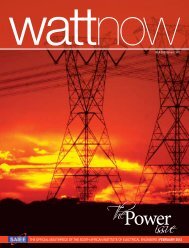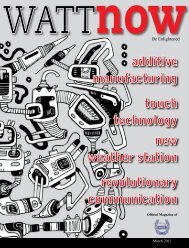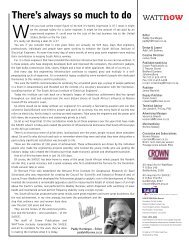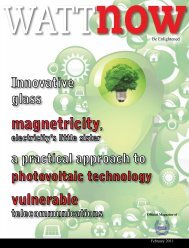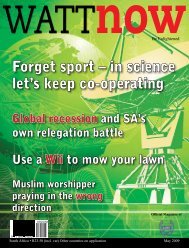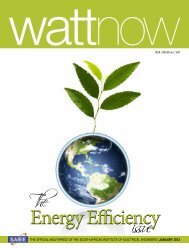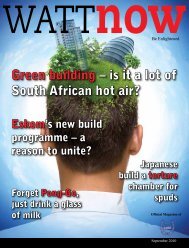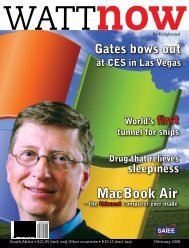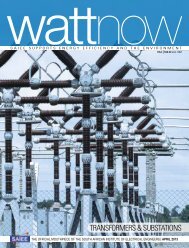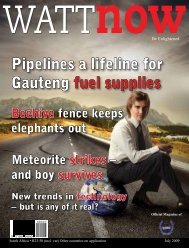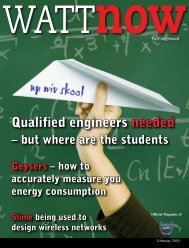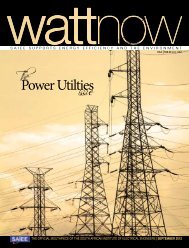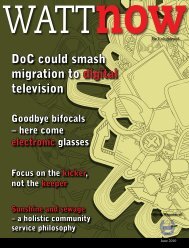Cut electricity consumption with automation - Watt Now Magazine
Cut electricity consumption with automation - Watt Now Magazine
Cut electricity consumption with automation - Watt Now Magazine
You also want an ePaper? Increase the reach of your titles
YUMPU automatically turns print PDFs into web optimized ePapers that Google loves.
was intrigued to learn that South Africa has been displaced by China<br />
as the leading producer of gold. Maybe this means that we should<br />
step up our production and beneficiation of platinum, chromium,<br />
ferrochrome, and manganese. Therefore we need to put aside small<br />
thinking and make room for thinking BIG.<br />
Thinking BIG means having goals. Great writers such as David<br />
Schwartz (author of “The Magic of Thinking Big) and Stephen Covey<br />
and have creatively imparted great wisdom on thinking big, knowledge<br />
respected by successful professionals the world over. Recently I<br />
read an anonymous quotation on goals. It said:<br />
“If your goals don’t scare you, you don’t have goals. You have plans.<br />
Plans are essentially checklists. A plan is not a big reach. Plans are<br />
what you make to fix the car, have friends over for dinner, or visit your<br />
parents. Plans are what you know you can do.<br />
Not goals, though. Goals are big and impossible. They challenge<br />
us to reach past the trees for something high and out of sight. You<br />
may have a goal to start up your own Group 5, or Murray & Roberts,<br />
which is much greater than simply having a plan to work for Group<br />
5 or Murray & Roberts . Goals take blood and sweat. They woo us to<br />
great risk. The results are uncertain and the rewards can be great”.<br />
Another great mind once said, “If you have never failed, then your<br />
goals have probably never been high enough”.<br />
Thinking big for me means planning to make a personal contribution<br />
to South Africa and the rest of the world. This means maximizing<br />
your career. This means advancing from your first diploma or degree<br />
to the next level. This means challenging yourself to become registered<br />
<strong>with</strong> your professional council even when your peers think it is unimportant.<br />
This means pursuing research so that South Africa can be a<br />
leader of best practice and not a follower. This means that if you are<br />
a minority in the New South Africa, energise and transform yourself<br />
into a new form to avoid becoming redundant. This may mean finding<br />
a field of specialisation that is more rare, that differentiates you, sets<br />
you apart, and therefore makes you essential. This means having an<br />
“abundance mentality”, a mentality that affirms that there is enough<br />
room here for all of us if we believe it. But if we think small we are<br />
doomed.<br />
Thinking big means seeing your international colleagues not as<br />
threats to your advancement, but as keen competition that keeps you<br />
in shape for the jungle of multinational companies that will inevitably<br />
enter our local playground in future. Thinking big means accepting<br />
that you may be an instrument of change due to the time you are<br />
born in to. That means that your dream to be a top notch specialist<br />
in a technical field may be derailed or deferred into a chief executive<br />
because transformation of our country needs you. Thinking big<br />
means quickly learning that to make a full contribution in the built<br />
environment you need to brush up on communication skills, marketing<br />
and client relationship skills, and human resources skills because<br />
engineering and technology have no choice but to become competitive.<br />
Imagine Coca Cola vs Pepsi; MTN vs Vodacom; Nike vs Reebok.<br />
You will soon realize that in this game called work, those that don’t<br />
compete don’t last.<br />
Engineering and the Built Environment is the place to be, for those<br />
who want to be part of the solution.<br />
When we as a nation think of creating a better life for all – we look<br />
to the Built Environment<br />
When we think of ASGISA<br />
– we look to the Built Environment<br />
When we think of Job Creation<br />
– we look to the Built Environment<br />
When we think of Traffic congestion<br />
– we look to the Built Environment<br />
When we think of Sustainable Development<br />
– we look to the Built Environment<br />
When we think of Load Shedding<br />
– the long term solution lies in the Built Environment!<br />
And so ladies and gentlemen, I conclude as follows. You are all<br />
instruments of change, as a consequence of the generation you are<br />
born in to. Instruments of change think big and are adaptable to<br />
change. Instruments of change fit in South Africa and in any other<br />
part of the world. Instruments of change are neither derailed by the<br />
entry of international colleagues, nor by the entry of international<br />
competitors. Instruments of change are generally part of the solution,<br />
and not part of the problem.<br />
Ladies and gentlemen, I challenge you to step out into the wide<br />
window of opportunity in 2010, in infrastructure, in BEE and in<br />
globalisation. Remember, as in the words of David Schwartz, written<br />
back in 1959: “The size of your thinking determines the size of your<br />
success.”<br />
And be reminded, as in my own words: the window of opportunity<br />
is so wide open, that there is no more room for thinking small.<br />
I thank you.<br />
The Impact of Distributed Generation on Electricity<br />
Restructuring and the Security of Power Systems<br />
The SAIEE and the American Institute of Electrical<br />
and Electronics Engineers Inc. (IEEE) have a Mutual<br />
Cooperation Agreement which results in joint lectures<br />
of the sort reported on here. This lecture was held at the<br />
University of the Witwatersrand on 26 May 2008 and was presented by<br />
an eminent electrical engineer Professor Mohammad Shahidehpour<br />
Dr Shahidehpour is a fellow of the IEEE, Carl Bodine Distinguished<br />
Professor and Chairman Electrical and Computer Engineering<br />
39



